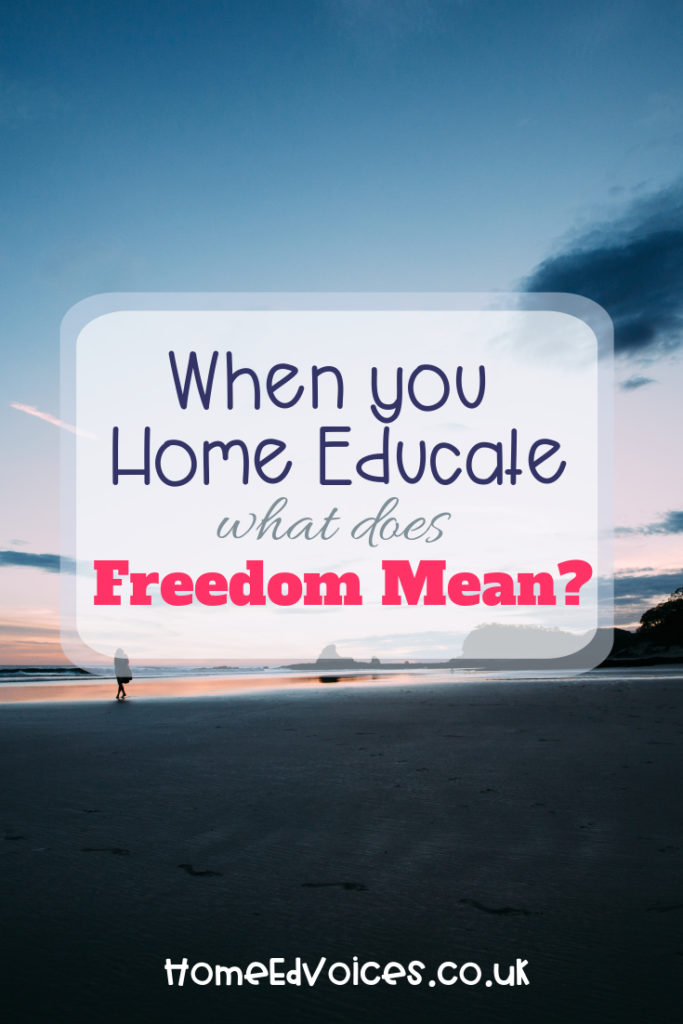When You Home Educate, what does Freedom Mean?

When I ask ‘What is the best thing about home education?’ during interviews for the Home Ed Voices podcast home ed parents often answer ‘the freedom’.
But what does freedom mean when you have taken on the direct responsibility of your children’s education?
Freedom of Time:
When you home educate, you don’t have to leave the house early to get your children to school. You can still choose to get up and do things early in the morning if you want, but that is a choice, not a requirement. This means that you can choose to start your day at a slower pace, or alternatively it means that you can fit in non-school things into that early morning time, such as exercise or work, or personal projects.
Of course not having to get up means that your children are more likely to get the sleep they need, especially as teenagers.
But on the flip side, not having to be somewhere at a certain time means that there is pressure on you to start the day yourself. Home ed children don’t run on bells, they are more likely to run on routines and encouragement from you. Which means the buck stops with you. This will become a running theme.
Freedom to set your own routines
Home educating means that you are free to set up your week in a way that makes sense for your family. For some families this might mean using weekends specifically for learning, so that you can keep some of the week free to spend time with a parent who works irregular hours. For others it might mean using necessary car trips as opportunities for learning, through discussion, or audiobooks.
Most home educators have to balance opportunities outside of the house with space to learn, play and rest within the home. We also have to work at balancing time to learn both inside and outside of the house with the domestic tasks that need to be done to keep a household running.
Freedom to set your own goals
Home education freedom mean that you don’t have to follow the national curriculum unless you choose to. You don’t have to use specific curriculum or any curriculum at all if you don’t want to. You don’t have to do homework that someone else has set.
However this means that you have to decide what your priorities are, advancing strengths and putting time into thoroughly supporting weaknesses. It means you are taking responsibility for what you are going to put in front of your children, and how you are going to support their specific needs.
If something isn’t working you have the freedom to change it. But you are the one who has to go find the alternative. The buck stops with you.
Home ed freedom is ‘freedom from’ and ‘freedom to’, but freedom always comes hand in hand with responsibility.
Freedom always comes hand in hand with responsibility.
I think that when we talk about how convenient it is to travel in term time, or how nice it is to not have to do the school run, it hides the fact that we have taken on this massive responsibility.
Many of us are reading blogs and books, and listening to podcasts, filling our social media with other home edders and homeschoolers, going to groups and conferences. We are spending our free time trying to work how to do this job – and it is a job, a career, a vocation – to the best of our ability. We are on the look out for the next thing – the next activity, or book, or event or concept to add into our home ed lives.
At its worst, it’s the fear of missing out, of keeping up with the Jones’s, coupled to the fear that we will are getting it wrong*. At it’s best it’s looking for something new and enriching we can adding into already busy lives.
(*Everyone worries at some point that they’re getting it wrong.)
When we talk about freedom, we mean that we have taken on this responsibility and we see where the advantages lie. But let’s not hide that it takes real sacrifice to do what we do – we sacrifice careers and money, free time and alone time to home educate our children. Statistically we sacrifice being seen as equals to our breadwinner partner (if we have one), and, because we are at home, take on the lion’s share of the domestic work, alongside mentoring and educating our children. We are often misunderstood and unsupported by our families, and questioned in the street. (My best example of this was my being quizzed on my children’s opportunities for ‘socialization’ while having my blood pressure taken. I asked for it to be taken a second time.)
Most of us choose to do this, and want our families to live this lifestyle, and we know it is a massive responsibility because we live it. We talk about the freedoms because that it the visible part of the iceberg. The rest is more complicated, feels more private, and is there under the water.
Freedom always goes hand in hand with responsibility. And talking about the responsibility is hard.
Such a fantastic, balanced article Katie. Sometimes it’s easy to forget just what a sacrifice it really is! Thank you for keeping it real, but positive.